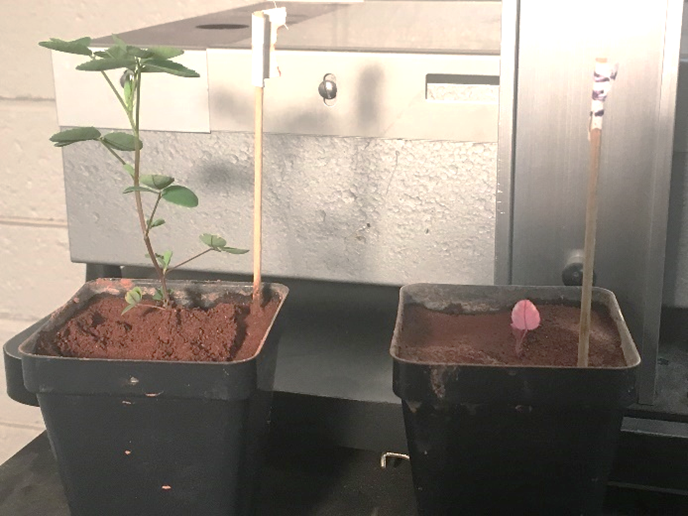News release
From:
Clover growth in Mars-like soils boosted by bacterial symbiosis
Benefits of nitrogen-fixing bacteria could aid efforts towards farming soils on Mars
Clover plants grown in Mars-like soils experience significantly more growth when inoculated with symbiotic nitrogen-fixing bacteria than when left uninoculated. Franklin Harris of Colorado State University, U.S., and colleagues present these findings in the open-access journal PLOS ONE on September 29, 2021.
As Earth’s population grows, researchers are studying the possibility of farming Martian soils, or “regolith.” However, regolith is lacking in some essential plant nutrients, including certain nitrogen-containing molecules that plants require to live. Therefore, agriculture on Mars will require strategies to increase the amount of these nitrogen compounds in regolith.
Harris and colleagues hypothesize that bacteria could play a cost-effective role in making Martian soils more fertile. On Earth, bacteria in soils help convert or “fix” atmospheric nitrogen into the molecules that plants need. Some of these microbes have symbiotic relationships with plants, in which they fix nitrogen within nodules found on plant roots.
To explore a possible role for symbiotic nitrogen-fixing bacteria in astroagriculture, the researchers grew clover in man-made regolith that closely matches that of Mars. They inoculated some of the plants with the microbe Sinorhizobium meliloti, which is commonly found in clover root nodules on Earth. Previous research had shown that clover can be grown in regolith, but had not explored inoculation with nitrogen- fixers.
The researchers found that the inoculated clover experienced 75% more root and shoot growth compared to the uninoculated clover. However, the regolith surrounding the inoculated plants showed no signs of elevated NH4—an essential nitrogen-containing molecule for plants—compared to the regolith surrounding uninoculated plants.
These findings suggest that the symbiotic microbes boosted clover growth, but did not result in excess production of nitrogen compounds that other plants growing nearby could hypothetically use. The researchers also grew some clover in potting soil and noted certain differences in the symbiotic relationship when comparing the plants grown in regolith versus soil.
These findings suggest the possibility that symbiosis between plants and nitrogen-fixing bacteria could aid agriculture on Mars. Future research could continue to explore such relationships with other crops and address issues with plant toxicity in regolith.
The authors add: “This study shows that nodule forming bacteria Sinorhizobium meliloti has been shown to nodulate in Martian regolith, significantly enhancing growth of clover (Melilotus officinalis) in a greenhouse assay. This work increases our understanding of how plant and microbe interactions will help aid efforts to terraform regolith on Mars.”
#####



 International
International


